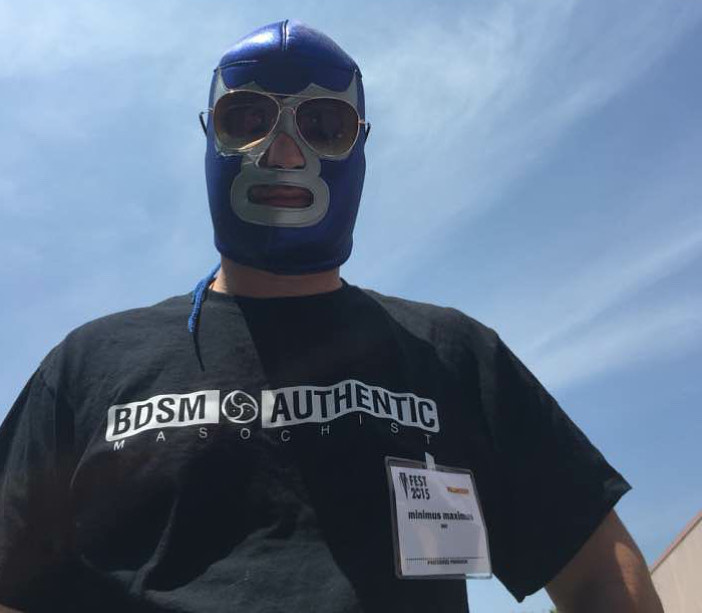When Lexi asked me to write this piece, I figured, “Sure, no problem. I’ve been in BDSM a long time, and I’ve been autistic even longer.” Both of these are topics I think about incessantly; both are topics on which I’ve actually done some research. Frankly, if there’re two things I can talk about without sounding like a schmuck, they’re BDSM and neurodivergence (and wrestling, of course, but that’s neither here nor there).
And yet, when I sat down to write this…well, to be entirely honest, I hated it. Impostor syndrome immediately kicked in, my own brain telling me that I’m either not autistic enough (I’m verbal, my stims aren’t immediately noticeable, etc.) or not kinky enough (I’ve only had two play partners over the last 5 years, I hardly ever teach in any formal sense, etc.). So, to assuage those feelings, I’ll offer the content warning that should honestly precede everything ever written: Ultimately, I can only speak to my personal experiences. And I sincerely hope that’s enough.
I am a member of the BDSM community. I am autistic. I would like to be able to say that neither has any connection to the other, but, frankly, I am not that naïve. Autism necessarily informs every aspect of my life, my sexuality included, and, while I know it’s reductive to think that one caused the other, fuck it. The human brain evolved to find patterns, to seek causes for manifest effects, but, even after acknowledging the possibility of seeing connections where there are none, I still am left with the unmistakable truth that the only way my sexuality makes sense to me is by seeing it through that prism of neurodivergence.
Relationships, dating, and sex are all complicated things that involve emotions and nebulous conventions that my neurology is simply not equipped to handle. BDSM gives them structure; it gives them rules. I’ve never been able to tell if someone is interested in me romantically or sexually. With BDSM I don’t have to; they will tell me. I can be good enough at reading social cues to notice when someone is disappointed in me, but I often don’t understand what exactly I can do to make the situation better. BDSM provides structure there too; actions have clearly-defined, negotiated consequences, and communication can be (and indeed typically should be) clear and to the point. One’s relationship can be unambiguous, structured, and controlled, even as the person “without” power in the power dynamic (since one’s position is necessarily negotiated), in a way that just makes sense to me.
This is not to say that being an autistic kinkster doesn’t present its own challenges. Even with the aforementioned benefits of negotiation in a relationship or interaction, I’m still not great at it, because I’m not great at communicating. It has taken me a long time to learn that communication is not just talking at someone. I can info dump all over you, but I don’t think explaining how the Billboard charts from 1974 reveal a larger truth about American culture is going to be much help in negotiating a BDSM scene. I mean, I won’t rule out the possibility for fulfilling someone’s very, very specific kink…but it’s a safe assumption.
If you’re reading this, you’ve almost certainly heard the podcast. But until I did, I never realized how distinct my speech pattern is. The reason I take those long pauses is that my brain is just moving faster than my mouth, and I have to be able to translate my rapidly firing neurons into a coherent thought and then construct it from words, and, since I have a compulsion to speak formally (very common in autism), the parts of my brain responsible for speech shut down for a moment or two while this process executes.
This degree of over-analysis permeates everything I do; certainly, it has my writing this piece. I’m not going to pretend that BDSM magically shuts it off, but what BDSM does do, again, is allow me to go to a place where I don’t need to worry about emotions, because the emotions I’m feeling are correct and in alignment.
What is it that we always say on the show? “BDSM is not therapy but it can be therapeutic.” And it’s my way of navigating the world and bringing certainty and structure to the uncertain, unstructured parts of it, especially when I might otherwise feel lost or confused.











Wow! What a lovely piece of writing. As someone who is quite possibly autistic (a few therapists has said – never have been diagnosed), and actively participates in kink and BDSM, this was very insightful for me. I enjoyed the flow of the piece, and look forward to more!
Awesome article, i have a bit of autism too. Been looking to get into the BDSM Community for a while and wasn’t sure whether i would be acceptable or not due to my autism. But now that i have read this piece it has given me new hope.
I know I’m a little late to the party, but I wanted to say thank you for taking time to write this! I recently started playing with someone with autism and I found this article insightful.
I have only recently started to explore the BDSM scene and have been diagnosed as autistic for 9 years. What you say about the rules and the structure is precisely the reason I enjoy it. I can’t pick up social cues, am not that interested in sex and am awful with relationships (romantic or not), getting the cues given to me helps so much. I was trying to find the reasons why it appeals to me, and this is it.
I am Neurotypical and have recently found myself entering into the BDSM world with my Neurodiverse partner and your article makes so much sense!!!!!!! Thank you so much for sharing